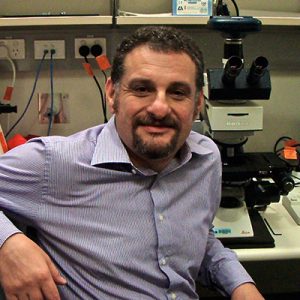
The healthy brain was thought to be free from immune cells. However, a recent discovery of immune cells patrolling the brain has opened new research avenues. Dr Brown is surveying for the immune cells that keep the brain healthy and what changes when the same cells turn nasty to cause MS.
Our immune system is designed smart enough to recognise and tolerate our own cells while eradicating foreign pathogens that can cause harm. During MS, this ‘tolerance’ breaks down. It is poorly understood how this happens, but Dr Brown, as part of this MS Research Australia funded study, is trying to work out how this happens.
Dr Brown, will also use a new drug being developed for MS that modulates the trafficking of immune cells. FTY20 is a potential oral agent in human clinical trials to treat MS. Watching how the body reacts to new drugs is one way of unravelling how the immune system works and the results are useful in predicting complications of immune-based therapies.
Understanding the processes regulating the central nervous system tolerance is crucial to identify novel therapeutic strategies aimed at restoring immune tolerance.
The healthy brain was thought to be free from immune cells. Recent findings show that immune cells travel through the brain and keep it healthy. These same cells are involved in the development of MS. Dr David Brown will determine the characteristics of the cells that maintain the healthy brain and what changes when the same cells cause MS. Working out the differences between good and bad immune cells will point to what may be changed to prevent these cells causing MS. Changing these cells may lead to new treatments for MS.
Dr Brown has examined the cellular immune response in normal and EAE central nervous system (CNS). In addition, Dr Brown has characterised an important and novel pathway involved in neuroimmune modulation which has not previously been described. The results could yield therapeutic strategies applicable to MS.
Updated: 03 January, 2008

